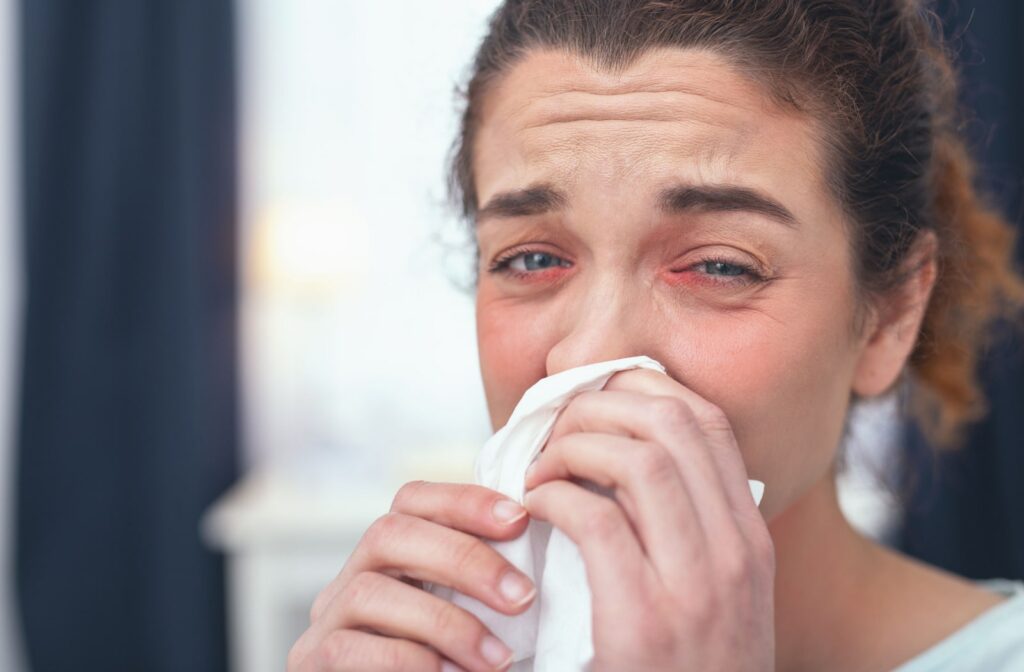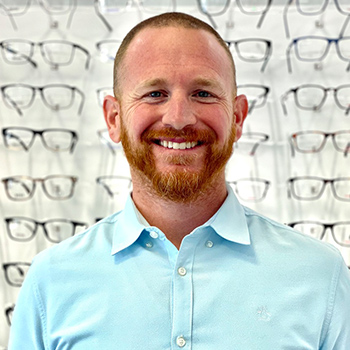Spring is a beautiful season of growth, renewal, and loads of pollen. For many people, that much pollen in the air means allergies. Of course, spring isn’t the only time you might experience this irritation, but it is a common time of year to experience allergic reactions.
Eye allergies are a condition that can cause symptoms such as itching, redness, and blurry vision. Allergies can also cause dry eye, worsening your blurred vision. To determine what’s causing your blurry vision, contact your optometrist for an eye exam.
What Are Eye Allergies?
Allergies come in many different types and affect around 40–50 million Americans. Whatever kind of allergy you have, they’re all caused by your immune system’s overreaction to an allergen. An allergen is a typically harmless substance, such as pollen, dust mites, or pet dander, that causes a reaction in certain people.
Allergies can first develop when you’re young. You may have a higher risk of developing allergies if your parents have them, but environmental factors can also have a part to play in their development.
While some people outgrow their allergies, being exposed to an allergen repeatedly as an adult could trigger an entirely new reaction.
If your allergen causes your eyes to become red and inflamed, it’s called allergic conjunctivitis.
Causes of Eye Allergies
Your allergies might become more severe in allergy season, while others experience eye allergies year-round. Typical triggers for eye allergies include:
- Pollens
- Pet dander
- Dust mites
- Mold
- Cigarette smoke
- Perfume
- Diesel exhaust
Even though allergic conjunctivitis shares a name with pink eye (viral or bacterial conjunctivitis), it’s not contagious.

How Can Allergies Affect Your Eyes?
There are a few different types of eye allergies. The most common type experienced is seasonal or perennial allergic conjunctivitis.
Seasonal allergic conjunctivitis (SAC) is experienced in spring, summer, and fall when there is plenty of pollen from various plants in the air. Perennial allergic conjunctivitis (PAC) occurs year-round, though typically with milder symptoms. PAC is caused by household allergens, such as pet dander and dust mites, rather than pollen. Both types have similar symptoms:
- Itching
- Red eyes
- Burning sensation
- Clear, watery discharge
Other types, such as vernal or atopic keratoconjunctivitis, have complex names but are simply forms of eye allergies mixed with skin issues. They are more severe and can impair your vision if left untreated.
All types of eye allergies can cause some form of discharge, from clear and watery to thick mucus. When this discharge gets stuck in your eye, it can make it hard to see, leading to persistent blurriness.
Contact Lens Allergies
One type of eye allergy is called contact allergic conjunctivitis. Irritation from contact lenses can result in eye allergy symptoms that lead to itching, redness, and lens discomfort. A more severe form of this type of allergy is giant papillary conjunctivitis.
Giant papillary conjunctivitis is when irritation from wearing contact lenses causes individual fluid sacs to form along the inner eyelid. This allergy is notable for causing blurry vision, as well as puffiness, itching, and mucous discharge.
Treating Eye Allergies
You can treat some symptoms of eye allergies with oral medications, such as antihistamines. However, antihistamines can reduce tear production and worsen your symptoms if you’re already dealing with blurry vision from dry eyes. You can use artificial tears to help soothe eye irritation and wash allergens from your eyes, or you can use a cool compress to relieve inflammation.
If your eye allergies continue to give your trouble, a doctor might prescribe additional treatments such as:
- Antihistamine or prescription eye drops
- Anti-inflammatory eye drops
- Eye drops that can shrink congested blood vessels
- Eye drop steroids
The best way to prevent eye allergies is to avoid the allergens that trigger them. This prevention is easier if you know what allergens are causing your symptoms. An allergist can help you discover your allergic triggers.
Eye allergens are typically airborne, which can make them tricky to avoid, but here are some steps you can take:
- Close windows during periods with high pollen
- Limit exposure to dust mites with mite-proof bedding
- Lower the humidity in your home to control mold growth
- Wash your hands after petting any animal
- Wear sunglasses to protect your eyes outdoors
When to See a Doctor for Blurry Vision
Blurry vision caused by allergies is often temporary and accompanied by other common allergy symptoms like red, itchy, and watery eyes.
It’s important to distinguish between normal allergy-related vision changes and signs that might indicate a more serious issue. Sometimes the blurry vision persists even after managing your allergy symptoms or is accompanied by other alarming symptoms such as:
- Severe eye pain
- Sudden vision loss
- Flashes of light
These symptoms could signal a condition unrelated to allergies, such as a retinal issue, glaucoma, or even a neurological problem.
In such cases, contact your eye doctor to rule out more serious conditions and ensure proper treatment to protect your eye health.
Wellness Through Clear Vision
While eye allergies can cause blurry vision, they aren’t the only cause. Allergies typically fade once you receive proper treatment, but if treating your allergies doesn’t resolve your blurriness, it could signify something more severe.
Our team at Dr. Bittel Optometry is experienced in finding and treating the root cause of blurry vision, whatever it may be. Book an appointment in Yorba Linda today.


